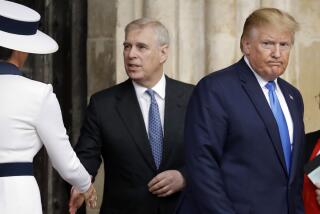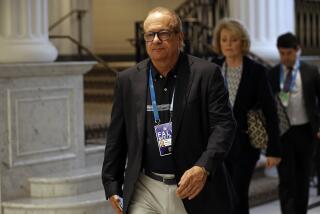Court Unseals Burkle Divorce Papers
- Share via
A Los Angeles court late Friday unsealed documents revealing details of billionaire Ronald W. Burkle’s bitter divorce fight -- records that he went to extraordinary lengths over the last three years to keep private.
The 1,200 pages of documents were made public two days after the California Supreme Court rejected Burkle’s effort to keep them under seal, which he said was necessary to protect the safety of his children. The high court let stand a decision striking down a law passed by the Legislature and signed by Gov. Arnold Schwarzenegger that would have shielded Burkle’s financial information from public view. The documents had previously been public for a time but were not widely reported on before being sealed.
The documents include explicit allegations by Burkle’s daughter about his conduct toward his ex-wife. They also provide an analysis of Burkle’s financial investments as of 1997, when the couple signed a post-marital agreement, and Janet Burkle’s account of their household spending and property holdings, as well as a window into his family’s upscale habits.
“For the vast majority of our marriage -- the last 20 of our 28-year marriage -- my husband and I lived among the most lavish of American lifestyles,” Janet Burkle stated in a September 2003 divorce filing.
The documents include a sworn declaration by the Burkles’ adult daughter that her father had told her that his security staff had “pictures and videos” of Janet Burkle and her boyfriend having sex.
Carrie Anne Burkle, now 29, said Ronald Burkle asked her and her brother John, now 25, to watch the tape, but later changed his mind. She said her father phoned his security director in front of her, and told her Janet Burkle was with her boyfriend “at this very moment.”
The daughter’s declaration was made in support of Janet Burkle’s 2003 application for a court restraining order, which was denied. The application accused her husband of spying on her, their young son and her boyfriend. Janet Burkle also claimed that her husband’s security agents followed her and their son into Jerry’s Deli when they went to lunch, and tailed her at a park.
In a letter to The Times, Burkle’s attorney, Patricia L. Glaser, disputed the allegations. “Mr. Burkle never told his daughter any such thing. There are no such videotapes. There was no such eavesdropping. This is not true.”
Glaser said the allegations had been withdrawn and the divorce court judge had ruled them inadmissible.
Burkle’s security chief, Frank Renzi, in a written response to The Times, said that there was no videotape, and that Carrie evidently had misconstrued a conversation with her father over her mother’s new boyfriend, an ex-convict. He said Carrie was reluctant to believe the two were involved. In response to Carrie’s refusal, Ronald Burkle asked her a question to the effect, “What do I have to do to convince you? Show you a videotape of them together?”
Burkle, in a divorce filing, said he was particularly concerned about security because of the 1973 kidnapping of the 15-year-old daughter of the owner of Stater Bros. supermarkets, where Burkle got his start in business.
Burkle said his father, then a vice president at Stater Bros., gathered ransom cash from various stores. Burkle and Janet, whom he was then dating, divided the money into suitcases to be delivered to the kidnappers, who released their hostage unharmed.
“Since that experience, I have had a heightened appreciation for the necessity of attempting to protect one’s family from potential kidnappers and other criminals,” Burkle said in a declaration.
The division of the Burkles’ fortune (Ronald Burkle’s worth has recently been estimated at more than $2 billion) had also been fiercely contested until this week. Janet Burkle claimed she was defrauded when she signed a 1997 post-marital agreement limiting her divorce settlement to roughly $40 million. Her claims were rejected Thursday by a California appellate court.
Ronald Burkle multiplied his fortune by merging, buying and selling supermarket chains, including Ralphs Grocery Co. and Food4Less. He is a friend of Bill Clinton and a heavy Democratic political donor, and he also contributed to Schwarzenegger’s campaign fund for ballot measures in 2006.
The grocery magnate’s family life, the unsealed records show, was supremely up-market.
Janet, in one of her filings, said the couple had six residences -- a Yucaipa ranch, a Laguna Beach estate, an oceanfront mansion in La Jolla, the historic Greenacres mansion in Beverly Hills, and two properties in Palm Springs. The Greenacres estate -- once owned by silent-film star Harold Lloyd -- had a dining room that sat 20. And they accumulated at least $25 million worth of art.
They got around in a fleet of luxury cars. “At Greenacres alone, we had (at the same time) two Porsches, one Ferrari, two Mercedes, and two hybrid electric-gasoline-powered cars,” Janet Burkle contended. Burkle said her husband owned a private 757 jet and a helicopter. He used the jet to fly himself, their young son, Andrew, and Clinton and his family to South Africa in 2003 for Nelson Mandela’s birthday celebration, she said.
Her husband had hand-tailored suits and employed a valet, she said. She purchased business suits, gowns, cocktail dresses and garden party outfits. “It was common for me to spend $15,000 at one time at Barneys, and my average monthly expense for clothing was at least $10,000 (a conservative estimate),” she said.
Burkle, in the papers, called the accounts exaggerated, saying that the aircraft, for example, belonged to his company and was not used for personal trips.
While acknowledging he is “a successful investor and businessman,” Burkle said his wife’s portrayal of him could hurt his relationship with leaders of organized labor.
Burkle, in the court records, said he had a partnership with Clinton and the California Public Employees Retirement System, which invests in labor-friendly companies. Union leaders, Burkle said, could shun him because “working closely with someone who purportedly lives that kind of lifestyle” might upset the unions’ “rank and file.”
Times staff writers Ted Rohrlich, John Spano and Andrew Blankstein contributed to this report.
More to Read
Sign up for Essential California
The most important California stories and recommendations in your inbox every morning.
You may occasionally receive promotional content from the Los Angeles Times.










